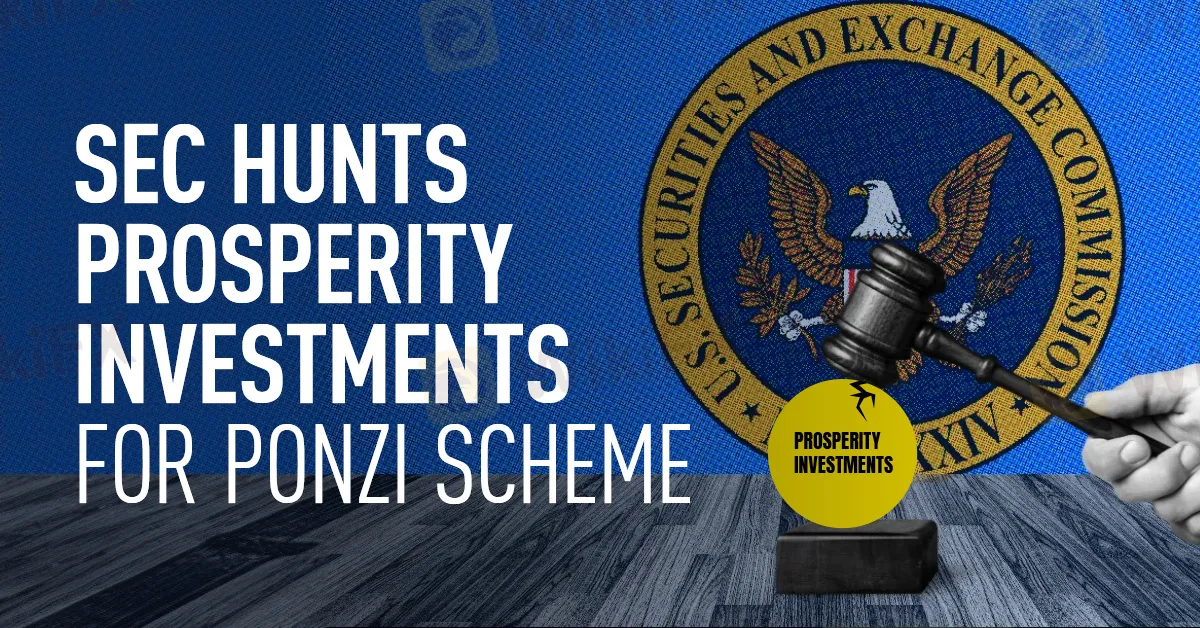简体中文
繁體中文
English
Pусский
日本語
ภาษาไทย
Tiếng Việt
Bahasa Indonesia
Español
हिन्दी
Filippiiniläinen
Français
Deutsch
Português
Türkçe
한국어
العربية
SEC Hunts Prosperity Investments for Ponzi Scheme
Abstract:SEC charges Loganville resident Prosper E. Beyond Moore and Prosperity Investments with defrauding investors in a $1.4 million Ponzi scheme, alleging false promises of elite investment services.

The Securities and Exchange Commission (SEC) has taken legal action against Prosper E. Beyond Moore, a resident of Loganville, Georgia, and his controlled entity, Prosperity Investments & Solutions, LLC. The charges involve the defrauding of numerous investors.
As detailed in the SEC's complaint, spanning from October 2021 to September 2022, Moore and Prosperity engaged in unregistered securities offerings, amassing over $1.4 million from more than 60 individual investors. Notably, many of these investors were either affiliated with Moore's church or became aware of his offerings through shared religious connections. The misleading representation portrayed Prosperity as an exclusive investment and lending platform, led by a seasoned team capable of delivering profits of up to 50% monthly.
The complaint asserts that despite Moore lacking prior experience in the financial industry, he singularly made investment decisions, and Prosperity, contrary to its claims, did not invest the majority of the funds it received. Instead, the SEC contends that Moore operated Prosperity as a Ponzi scheme, utilizing funds from new investors to make payments to existing investors and cover personal expenses. Meanwhile, fabricated account statements were used to create the illusion of profits.

This legal action, filed in the United States District Court for the Northern District of Georgia, charges Moore and Prosperity with violating Sections 5(a), 5(c), and 17(a) of the Securities Act of 1933, as well as Section 10(b) of the Securities Exchange Act of 1934 and Rule 10b-5 thereunder.
In response to the SEC's complaint, Moore and Prosperity, without admitting or denying the allegations, consented to a permanent injunction order. This order prohibits them from violating the charged provisions, with the court later determining disgorgement, prejudgment interest, and civil money penalties.
Furthermore, Moore agreed to a permanent officer-and-director bar under Section 20(e) of the Securities Act and Section 21(d)(2) of the Exchange Act. Additionally, he consented to an injunction permanently barring his participation in the issuance, purchase, offer, or sale of securities, except within his personal account.

Disclaimer:
The views in this article only represent the author's personal views, and do not constitute investment advice on this platform. This platform does not guarantee the accuracy, completeness and timeliness of the information in the article, and will not be liable for any loss caused by the use of or reliance on the information in the article.
Read more

BlackBull: A Closer Look at Its Licenses
When selecting a broker, understanding its regulatory standing is an important part of assessing overall reliability. For traders seeking to protect their capital, ensuring that a platform operates under recognised and stringent oversight can make all the difference. Keep reading to learn more about BlackBull and its licenses.

Dark Side of AETOS: They Don’t Want You to Know
AETOS is an Australia-based broker. All over the internet, you will find positive reviews about this broker, but no one is talking about the risks involved with AETOS. However, we have exposed the hidden risks associated with AETOS

Contemplating Investments in Quotex? Abandon Your Plan Before You Lose All Your Funds
Have you received calls from Quotex executives claiming to offer you returns of over 50% per month? Do you face both deposit and withdrawal issues at this company? Or have you faced a complete scam trading with this forex broker? You're not alone. Here is the exposure story.

15 Brokers FCA Says "Are Operating Illegally" Beware!
If a reputable regulator issues a warning about unlicensed brokers, it's important to take it seriously — whether you're a trader or an investor. Here is a list you can check out- be cautious and avoid getting involved with these scam brokers.
WikiFX Broker
Latest News
Global week ahead: Banking bellwethers and a tariffs waiting game
CNBC Daily Open: Solid earnings beats might mask tariff volatility these two weeks
BlackBull: A Closer Look at Its Licenses
Top Wall Street analysts are confident about the potential of these 3 stocks
Retirees are fleeing these 10 U.S. cities—most are in states where you need over $1 million to retire
In recent layoffs, AI's role may be bigger than companies are letting on
Stock futures are little changed as traders await big tech earnings, eye trade developments: Live updates
Asia markets set to open mixed as investors assess trade developments, await China benchmark rates
Asia markets trade mixed as investors assess trade developments, await China benchmark rates
Currency Calculator



